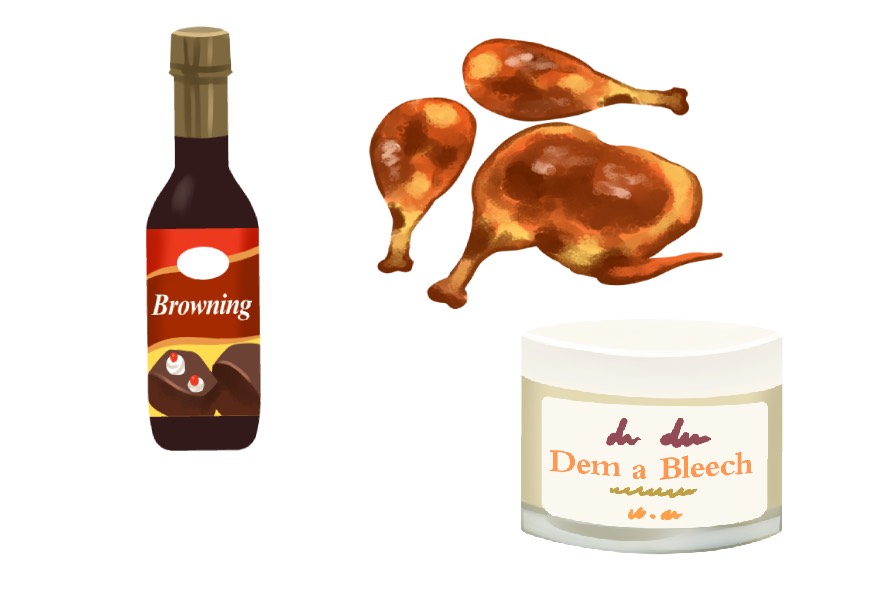I overheard once that there are three things that terrify Jamaicans: green lizards, a flying cockroach and white chicken. I cannot stress enough how accurate a blanket statement this is. I do not know the origin of such fears, but I’ve seen remnants of this belief or false truth- in at least four family generations. Green lizards and flying cockroaches are common in Jamaica and a part of the natural habitat, so one can only imagine the burden of fear weighing down an entire country. The white chicken however, can be fixed and for this, we choose browning. Browning is used in the seasoning marinate to color meats to a desired dark brown. No, simple caramelizing just won’t do — No. White. Chicken.
“Browning” is also a term or phrase used to describe a (desirable) light-skinned Black person. I was eight years old when Buju Banton’s 1992 hit “Love Me Browning” was released. The chorus:
Me love me car Me love me bike
Me love me money and ting
But most of all, Me love me browning
Love-a me car Me love me bike
Me love me money and ting
But most of all, Me love me browning
“Browning” in this context is a light-skinned woman. Her “value” and “status” being equated to high value items, money, bikes and cars. We all loved this song, it was/is a jam! Sadly, I knew and internalized that I didn’t mirror this object of desire. Heck, the artist himself didn’t mirror his own desire!. To his credit, Banton did follow up later that year with the title, “Love Black Woman,” but the damage had already been done. The words and idea of not being enough or desired was internalized not only by us, but also the generations that came before us. Thus, we took action and we bleached. Yes, at eight years old I could name at least three bleaching creams. Although I didn’t use bleaching creams at 8 years old, it wasn’t because I didn’t want to. Who didn’t? It was because I didn’t have the money and the adults in the room wouldn’t buy it. Though, it was an ideal or a standard of value that was consumed by us all. I thought I had to be light-skinned to receive affection and to be loved.
Now we have an entire nation carrying the weight of not being enough and, just as how we brown a chicken to our desire, we seek “browning” for our dark skin. It is my experience that in Jamaican culture we attempt to fix rather than address the root of the matter. It’s just easier. Is it? Recently, a ruling from the Jamaican High Court made headlines that favored a Primary School’s right to ban dreadlocks after a 5-year-old girl was barred from attending until her parents agreed to cut her hair. Echos from around the world could be heard from people asking how could this be in Jamaica. Jamaica, popularly known for dreadlocks and Rastafarianism, and a predominantly Black country, would bar a child from attending school until her hair was “fixed.” I hate to tell you, but this ruling is on brand for Jamaica. And, if I’m really honest, we do not like to be known or to be popular for dreadlocks and Rastafarianism. Thus, Bob Marley and his legacy, love. Dreadlocks not so much. The high court ruling is that of the old guard who are of the mindset that they’re protecting the only Jamaican that is deemed worthy.
The school in question has right their wrong and has now agreed to allow the girl, now 7 to attend school as she is, but without question, now scarred by the ordeal. As for me, I’ve been going to the beach every week this summer and every opportunity I get, I bask in the sun (with sunscreen), blissfully adding layers of darkness to my beautiful Black skin. It’s my act of protest and a celebration of sorts — me celebrating being unbothered by generational burdens. Your truths not only are not mine, but they’re also wrong.
To the adults in the room, let’s address our false truths and allow young Black girls to be girls and not be forced to be someone who they’re not. Perfectly ok to still keep browning that white chicken though!


Pingback: Jamaican Household Pantry (part. 1) – Jamoji